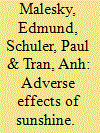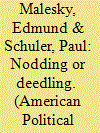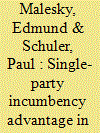| Srl | Item |
| 1 |
ID:
118972


|
|
|
|
|
| Publication |
2012.
|
| Summary/Abstract |
An influential literature has demonstrated that legislative transparency can improve the performance of parliamentarians in democracies. In a democracy, the incentive for improved performance is created by voters' responses to newly available information. Building on this work, donor projects have begun to export transparency interventions to authoritarian regimes under the assumption that nongovernmental organizations and the media can substitute for the incentives created by voters. Such interventions, however, are at odds with an emerging literature that argues that authoritarian parliaments primarily serve the role of co-optation and limited power sharing, where complaints can be raised in a manner that does not threaten regime stability. We argue that under these conditions, transparency may have perverse effects, and we test this theory with a randomized experiment on delegate behavior in query sessions in Vietnam, a single-party authoritarian regime. We find no evidence of a direct effect of the transparency treatment on delegate performance; however, further analysis reveals that delegates subjected to high treatment intensity demonstrate robust evidence of curtailed participation and damaged reelection prospects. These results make us cautious about the export of transparency without electoral sanctioning.
|
|
|
|
|
|
|
|
|
|
|
|
|
|
|
|
| 2 |
ID:
100767


|
|
|
|
|
| Publication |
2010.
|
| Summary/Abstract |
Recent scholarship argues that one solution to ensure longevity and economic growth in an authoritarian regime is to co-opt potential opposition by offering them limited policy influence in a national legislature. Although cooptation theory generates a number of predictions for delegate behavior within an authoritarian parliament, the opacity of such regimes has made empirical confirmation difficult. We resolve this problem by exploiting the transcripts of query sessions in the Vietnamese National Assembly, where delegates question the prime minister and Cabinet members on important issues of the day. Using a content analysis of queries, we offer the first empirical test of delegate behavior in nondemocratic parliaments. We find that some delegates exhibit behavior consistent with cooptation theory by actively participating in sessions, demonstrating criticism of authorities, and responding to the needs of local constituents. Such responsiveness, however, is parameterized by regime rules for nominating, electing, and assigning parliamentary responsibilities to individual delegates.
|
|
|
|
|
|
|
|
|
|
|
|
|
|
|
|
| 3 |
ID:
171198


|
|
|
|
|
| Summary/Abstract |
Why do voters in single-party regimes express support for the ruling party in such large numbers? Scholars offer three sets of explanations: 1) Support is manipulated by regime leaders or falsified by frightened voters; 2) Support is due to genuine popularity or “performance legitimacy”; 3) The incumbent party holds an extreme incumbency advantage due to voters’ certainty about their candidates’ policy positions or access to state resources. Despite the impressive theoretical development in this literature, these arguments have not been subjected to a research design capable of examining the relative importance of each of these factors. We use a unique survey experiment on nearly 42,000 Vietnamese citizens over three years that reduces the threat of preference falsification and allows us to isolate voter's true preferences as much as possible. While we find some evidence for all three explanations, we find substantial support for incumbency bias. An important subset of Vietnamese voters—those inclined to vote for non-party candidates—sincerely favor the party under conditions of uncertainty about the candidates’ policy stances or experience in the legislature.
|
|
|
|
|
|
|
|
|
|
|
|
|
|
|
|
| 4 |
ID:
120587


|
|
|
|
|
| Publication |
2013.
|
| Summary/Abstract |
A commonly proffered theory to explain the use of elections in authoritarian regimes is that they help identify talented young leaders who can be groomed for leadership positions. Unfortunately, due to the difficulties of obtaining data in authoritarian settings, this hypothesis has not been tested satisfactorily. We examine candidate-level data from the 2007 Vietnamese National Assembly (VNA) election and subsequent selection of candidates for top positions within the VNA and for top ministry positions. We find no evidence that vote share is associated with promotion to leadership positions in the VNA and only limited evidence for vote share association with ministerial posts. Instead, the results indicate that leadership selection takes place within the party rather than through elections. Furthermore, behavior within the assembly suggests that those who were chosen may have been selected based on their loyalty or at least pliancy to the party elites.
|
|
|
|
|
|
|
|
|
|
|
|
|
|
|
|
| 5 |
ID:
179246


|
|
|
|
|
| Summary/Abstract |
While Vietnam suffered economically due to COVID-19, the ruling Vietnam Communist Party burnished its image through its successful management of the crisis. This review examines the roots of the party’s success and discusses why the party has nonetheless continued to stifle dissent. It also previews the 13th Party Congress.
|
|
|
|
|
|
|
|
|
|
|
|
|
|
|
|
| 6 |
ID:
185202


|
|
|
|
|
| Summary/Abstract |
COVID-19 and the Party Congress dominated the headlines in Vietnam in 2021. This essay reviews the leadership changes after the Party Congress and the challenges the new leaders faced in confronting the Delta variant of COVID-19. It also considers other economic challenges that have simmered under the surface, such as its approach to securing infrastructure funding, particularly in the energy sector. It concludes by considering Vietnam’s international posture relating to the US and China.
|
|
|
|
|
|
|
|
|
|
|
|
|
|
|
|